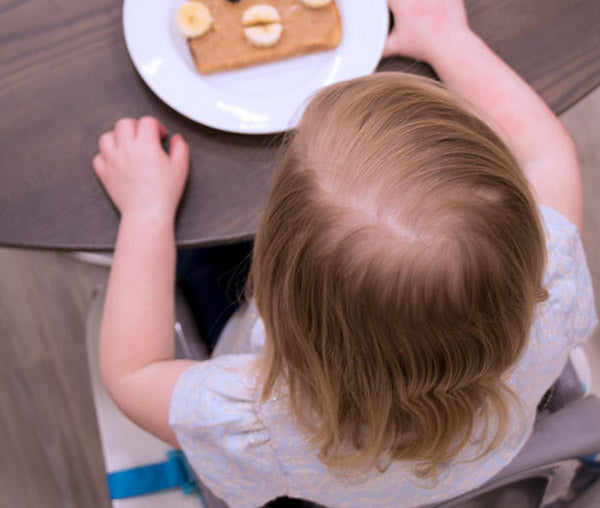
October 30, 2020
Help! My Kid Keeps Throwing Food on the Floor
Every parent has been there. After lovingly preparing a delicious and nutritious dinner for your toddler to eat, your angel decides to throw fistfuls of food onto the floor instead. Mealtime mischief is real, but you can manage it! Here are a few lessons I’ve learned during my short 18 months of motherhood that may help you during meal time and avoid all the throwing food on the floor mayhem.
1. Pay attention
I’ll be the first to admit one of my worst habits is constantly checking my phone. From reading and responding to text messages, to watching Instagram Stories and even Face Timing with family, the addiction is difficult to avoid.
I prefer to have dinner after my daughter goes to bed, so I usually just sit with her at the table while she eats. Unfortunately, that means I’m often reaching for my phone the minute her meal begins. I already wanted to reduce the amount of time spent on my phone, but when I noticed a correlation between my phone usage and her mealtime mischief, it became an even higher priority. I observed that she threw food more frequently when I wasn’t giving her my full attention, or even part of it (insert mega mom guilt here).
The key is to give your child an appropriate amount of attention during mealtimes. I’ve started leaving my phone charging in the other room, or only bringing it to the table to FaceTime grandma and grandpa (they love it, and we do too). I find that when my kiddo is using the phone with me to communicate with a family member, as opposed to when I use it alone, she is much more engaged and much less likely to be throwing food on the floor.

2. Combat boredom
For toddlers, every moment is a teaching moment. Their little sponge brains are soaking up everything around them, which often means something that is menial or insignificant to us is utterly fascinating to them. Theoretically, one would think that a toddler is never bored, but we both know that isn’t true. Since toddler attention spans are on the short side, 1-year-olds are only expected to last 15 minutes -- tops -- at the dinner table.
So, when our little ones get bored, one of the ways they show it is by throwing food on the floor! Here are a couple of tips to keep them interested and engaged at the table and prevent boredom:
Play a game to identify the food on his plate
- As children’s vocabularies expand, they enjoy learning how to verbally identify everything around them. Food is no exception. Encourage your toddler to study his plate and point out all of the different options available to him. Name each food and encourage him to do the same. Not only will this increase his verbal skills, but it will also help him remember his favorite foods. So, the next time you say “It’s time for green beans!” he just might run to the table with excitement instead of running away from you.
Rotate the utensils and tableware provided
- If your child is bored, it might not have anything to do with the food on their plates. They might just be sick of the purple cup and orange spoon. Shake things up by occasionally offering a new plate or fork. If this idea backfires and your child demands to use the same cup or bowl, then just disregard this advice. That said, you may be surprised to find that making a simple change at the table could be incredibly exciting from your toddler’s point of view.
3. Know when to end the meal
When my daughter gave up bottles at twelve months old and switched to proper meals and sippy cups, I panicked. For the first year of her life, taking in enough ounces of milk each day was a key component of sleeping through the night. I feared if she didn’t finish her meal, especially her dinner, we would ruin the sleep schedule we worked so hard to create. A friend gently reminded me, “She isn’t a newborn. If she chooses to eat like a bird or skip a meal every now and again, she will still sleep through the night.”
In our case, this turned out to be true.
With that fear out of the way, I felt empowered to shut down dinner if she was throwing food on the floor rather than into her mouth. Now I pay attention to the signs she gives me, whether that means she is full or just bored, and stop forcing her to stay in her high chair when she is desperate to get down. As a result, she no longer feels compelled to demonstrate she is totally over it, and I don’t have to scrape sweet potato off the rug as often.
Do you have a food thrower? Was your kid once a food thrower, and you’ve made it to the other side? Parents, let’s help each other out with other tips and tricks to restore our collective sanity. Please leave a comment with your wisdom below.
